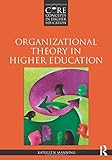Organizational theory in higher education Manning, Kathleen
Material type: TextSeries: Core Concepts in Higher Education | Joh, Edward P. St. - Editor | Gasman, Marybeth - EditorPublication details: New York Routledge 2013Description: xii, 219 pISBN:
TextSeries: Core Concepts in Higher Education | Joh, Edward P. St. - Editor | Gasman, Marybeth - EditorPublication details: New York Routledge 2013Description: xii, 219 pISBN: - 9780415874670
- 378.101 M2O7
| Item type | Current library | Collection | Call number | Status | Date due | Barcode | Item holds | |
|---|---|---|---|---|---|---|---|---|
 Book
Book
|
Ahmedabad | Non-fiction | 378.101 M2O7 (Browse shelf(Opens below)) | Available | 180719 |
Browsing Ahmedabad shelves, Collection: Non-fiction Close shelf browser (Hides shelf browser)
Organizational Theory in Higher Education offers a fresh take on the models and lenses through which higher education can be viewed by presenting a full range of organizational theories, from traditional to current. By alternating theory and practice chapters, noted scholar Kathleen Manning vividly illustrates the operations of higher education and its administration. Manning’s rich and interdisciplinary treatment enables leaders to gain a full understanding of the perspectives that operate on a college campus and ways to adopt effective practice in the context of new and continuing tensions, contexts, and challenges.
Special features include:
A unique presentation of each organizational model that includes both a theory chapter for contextual background and a case chapter illustrating the perspective in practice
Coverage of eight organizational approaches, both traditional as well as those often excluded from the literature—organized anarchy, collegium, political, cultural, bureaucratic, new science, feminist, and spiritual.
Consistent organizational elements across each theoretical chapter—including theoretical foundation, structure, metaphor, characteristics, and strengths and weaknesses—so that readers can better assess appropriate fit of theory to particular situations
Questions for Discussion and Recommended Readings assist the reader to make connections to their practice and to develop an in-depth understanding of the organizational theories
Organizational Theory in Higher Education provides a clear understanding of how organizational models can be used to elicit the most effective practice and to navigate the complexity of higher education today. This important book is ideal for courses in higher education administration and organizational theory and for administrators and practitioners seeking to gain insight into innovative ways to approach organizations.
There are no comments on this title.








